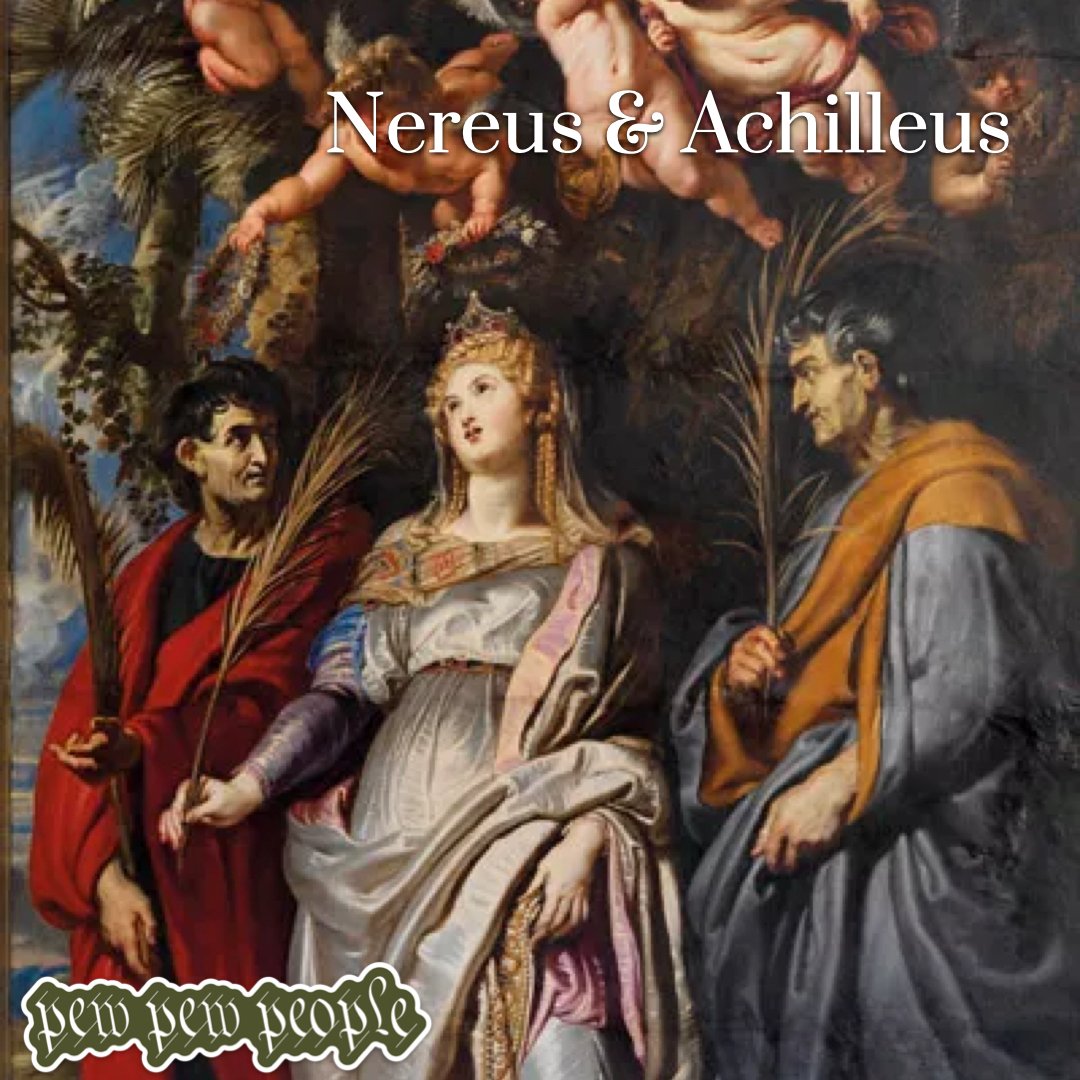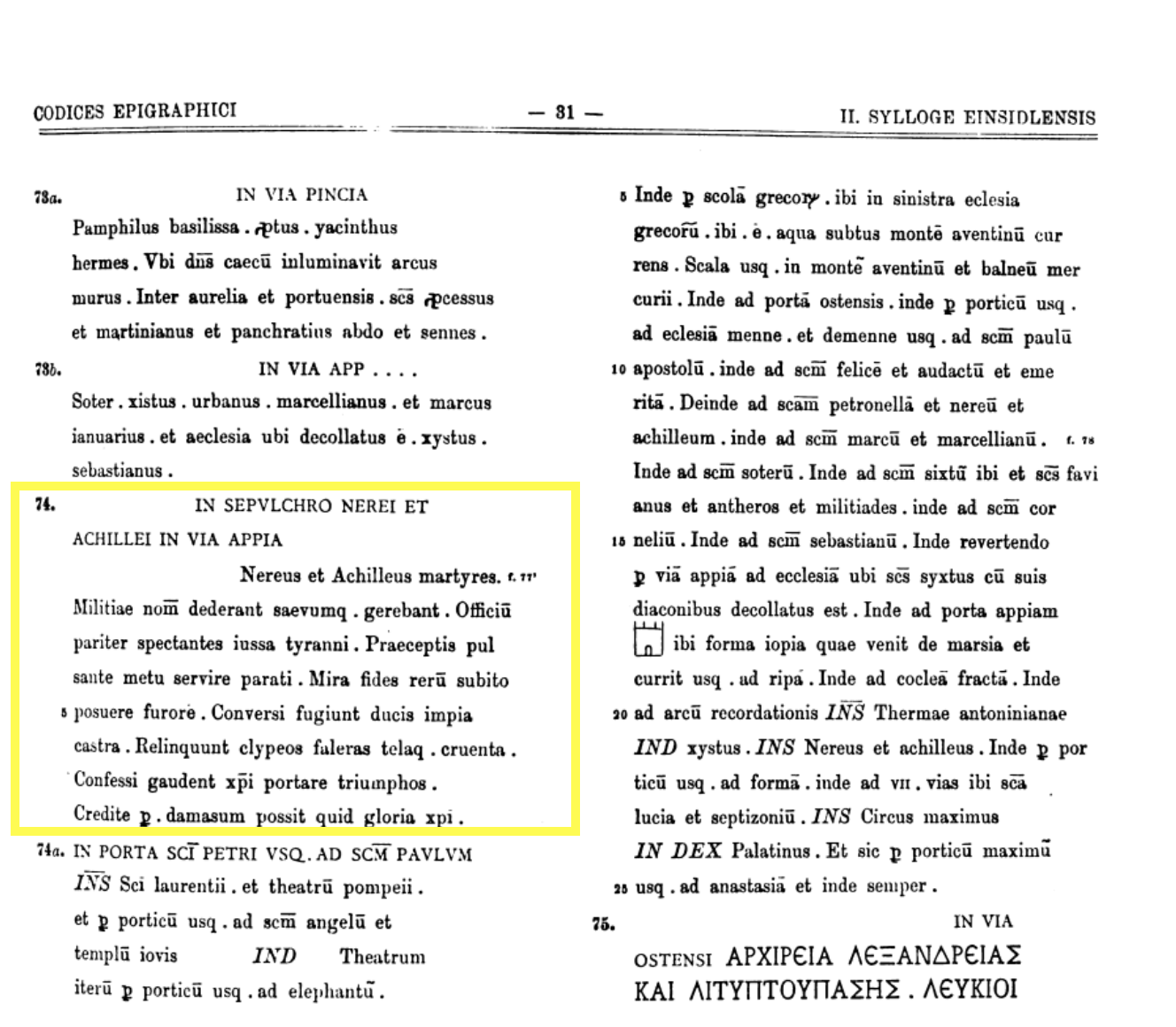Nereus & Achilleus
🗓️ May 12th
According to the earliest testimony by Pope Damasus in the 6th century, Nereus and Achilleus were soldiers who were martyred as Christians. A brief story about their life was inscribed on a tablet marking their graves within a large Christian crypt established by a wealthy woman named Domatilla. Modern scholars suggest they were buried there because they belonged to her household in some way, perhaps as servants.
DeVoragine’s Golden Legend expanded upon this early source, which Caxton preserves. Butler seems to be the first to assign them a feast on May 12th.
Mandatory Fun:
Acta Sanctorum, May Vol. 2
G.B. de Rossi, Inscriptiones Christianae urbis Romae Vol. 2 (1888), p.31
Caxton, The Golden Legend, Vol. III (1483)
Butler’s Lives of the Saints, Vol. V (1866)
Courtesy HathiTrust Digital Library
Militiae nomen dederant saevumq (eu) gerebant officium, pariter spectantes iussa tyranni, pulsating praeceptis metu servire parati. Mira fides rerum: subito posuere furorem, conversi fugiunt, ducis impia castra relinquunt, proiciunt clipos faleras telaq (eu) bloody, confessi gaudent Christi portare triumfos. Credit per Damasum possit quid gloria Christi.
Translation: They had enlisted for military service and were performing their cruel function, just as attentive to the tyrant’s commands, ready to obey orders, compelled by fear. Wonderful but true! Suddenly they deposit their anger. Converts flee, abandon the commander’s bad camp, hurl their shields, decorations and bloody weapons. As they confess Christ, they rejoice in taking his triumphs. By the authority of Damaso believe what Christ’s glory can do.
Caxton (1483)
Here follow the Lives of Nereus and Achilleus, and first the interpretation of their names.
Nereus is as much to say as council of light. Or Nereus is said of nereth, that is a lantern, and us, that is hasting. Or Nereus is said of ne and reus, which is to say no thing guilty. He was then council of light in preaching of virginity, a lantern in honest conversation, hasty in fervour of love to get heaven, and never guilty in his conscience. Achilleus is said of achi, that is to say my brother, and lesa, that is health, as who saith, the health of brethren. The passion of these twain wrote Eutichius, Victorine, and Maro, servants of Christ, diligently.
Of the Saints Nereus and Achilleus.
Nereus and Achilleus were gelded, and chamberlains of one Domicella, niece of Domitian the emperor, whom S. Peter the apostle baptized. And this Domicella had to husband a man that was called Aurelian, and was son of one of the councillors of the emperor. And when she was curiously clad and arrayed in robes of purple and precious stones, these two glorious saints preached to her the faith of Christ and the virtue of virginity; they praised it much in showing that it was nigh neighbour unto God, sister unto angels, cousin unto saints, and of nature born with creature human. And the woman that is married is subject to man. and is beaten with staves and fists in such wise that they be delivered of their children ere their time, deformed and lame, and where in her youth she might unnethe suffer teachings and admonestments of her mother, which was but soft and amiable, she should now by the contrary suffer of her husband great shames, reproofs, and villainies. And she among all other things answered: I know well that my father was jealous over my mother, and much sorrow suffered my mother, and my husband shall be such an one hereafter. Thereto they answered: When they be new wedded they seem much debonair, but after, when they feel themselves married, they reign much cruelly, and sometimes they make their maidens mistresses greater than their wives, and thus all holiness may be lost, but by penance may it be recovered, and virginity may not come again to his perfection, how well that the culpe of sin may well be defaced, and the virginity may not be had again.
Then this damsel, which was named Flavia, believed in God and avowed to him her virginity, and received the veil at the hand of S. Clement. And when her husband heard this he gat licence of the emperor that he might do what he would with his wife, and also of them that had converted her. And he sent them all three into an isle called Pontiana, and by this he supposed to do that the foresaid saints, that is to say S. Nereus and S. Achilleus, should turn the purpose of his wife, touching the avow of the virginity that she had made. And after that, a little time, he went to the virgin and also to the saints, to the end that they should change their purpose, and they in no wise would not, but yet more strongly than tofore were they confirmed and comforted, and said plainly they would in no wise do, ne make sacrifice to the idols, for they had been baptized of S. Peter the apostle, which so had confirmed them in the law and faith, that they might make no sacrifice but only to God; and therefore their heads were smitten off, and so suffered martyrdom about the year of our Lord four score. Of whom the bodies were buried by the sepulchre of S. Pernelle. And the other saints, that is to say, S. Victorine, Eutichius, and Maro, which were about them as servants, were put to labour all day in the gardens, and at even was given to them brown bread, black and rough, which was made of great meal and bran. Finally he made Eutichius to die by force of famine and to give up his spirit. He did do cast S. Victorine into foul and stinking water, and there was drowned, and he made S. Maro to be laid under a stone the which seventy of his servants might unnethe move, and the glorious saint cast the stone upon his shoulders as lightly as it had been a little straw, and bare it two miles farther from thence, for which cause many were converted and believed in God, for which cause the master's councillors did him to be slain. And after this Aurelian did do bring the damsel from the place of exile, and sent to her two virgins named Euphrosyne and Theodora, which had been nourished with her, to the end that they should turn and change her vow, but she converted these two virgins to the faith by her exhortation. Then Aurelian took the husbands of the two maidens and three enchanters with him, and came to Domicella for to wed and accomplish the marriage by force against her will; but Domicella, as God would, converted the young men to the faith of Jesu Christ. But when Aurelian saw that she had converted the two young men and the two virgins aforesaid, he led her into his chamber and made of enchanters to sing, and commanded the others to dance with him as he that would defoul Domicella, but the jugglers left singing, and the others dancing, and he himself ceased not to dance two days continually, unto the time that he expired and died tofore them all. Then Luxurius, which was his brother, gat leave to slay all them that believed in Jesu Christ. And he did so much that in the place where they dwelled he did do set a fire, and they, being in their prayers, rendered their souls unto God, whose bodies S. Cæsarius, upon the morn finding no thing hurt, buried. Then let us pray to them that we may come to everlasting bliss in heaven. Amen.
Butler (1866)
THEY were eunuchs or chamberlains belonging to St. Flavia Domitilla, zealous Christians, and with her were banished by Domitian into a little isle on the coast of Terracina, called Pontia. Their acts say, that they were afterwards beheaded at Terracina, under Trajan. Their festival was kept at Rome with great solemnity in the sixth age, when St. Gregory the Great spoke on it his twenty-eighth homily, in which he says: “These saints before whose tomb we are assembled, despised the world and trampled it under their feet, when peace, plenty, riches, and health gave it charms.” Their old church in Rome lay in ruins, when Baronius, to whom it gave the title of cardinal, rebuilt it with splendour, and restored to it their relics, which had been removed to the chapel of St. Adrian.


